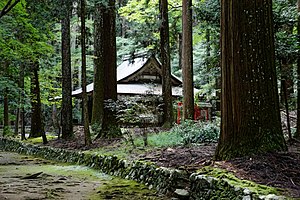Kōzan-ji
| Kōzan-ji 高山寺 |
|
|---|---|

Path to the Golden Hall
|
|
| Basic information | |
| Location | 8 Umegahata Toganō-chō, Ukyō-ku, Kyoto, Kyoto Prefecture |
| Affiliation | Shingon Buddhism |
| Deity | Shaka Nyorai (Śākyamuni) |
| Country | Japan |
| Website | http://www.kosanji.com/ |
| Architectural description | |
| Founder | Emperor Kōnin |
| Completed | 774 |
Kōzan-ji (高山寺?), officially Toganōsan Kōsan-ji (栂尾山高山寺?), is a Buddhist temple of the Omuro sect of Shingon Buddhism in Umegahata Toganōchō, Ukyō Ward, Kyoto, Japan. Kōzan-ji is also known as Kōsan-ji and Toganō-dera. The temple was founded by the Shingon scholar and monk Myōe (1173 – 1232) and is renowned for its numerous national treasures and important cultural properties. The Chōjū-jinbutsu-giga, a group of ink paintings from the 12th and 13th centuries, are among the most important treasures of Kōzan-ji. The temple celebrates Biyakkōshin, Zenmyōshin and Kasuga Myōjin, as well as the temple's tutelary Shintō deity. In 1994, it was registered as part of the UNESCO World Heritage Site "Historic Monuments of Ancient Kyoto".
Togano, located deep in the mountains behind Jingo-ji temple, which are famous for their autumn foliage, is considered an ideal location for mountain asceticism, and there have long been many small temples in this location. In addition to Kosan-ji, there have been other temples in the area, such as Toganoo-ji (度賀尾寺?) and Toganoo-bō (都賀尾坊?). According to legend, these were said to have been established by the imperial orders of Emperor Kōnin in 774, however, the accuracy of these claims is not clear.
...
Wikipedia
